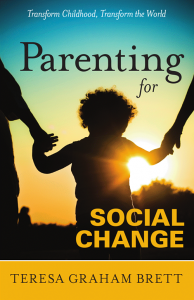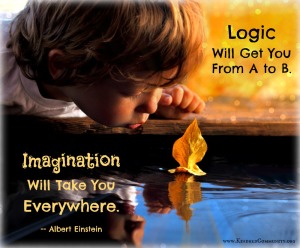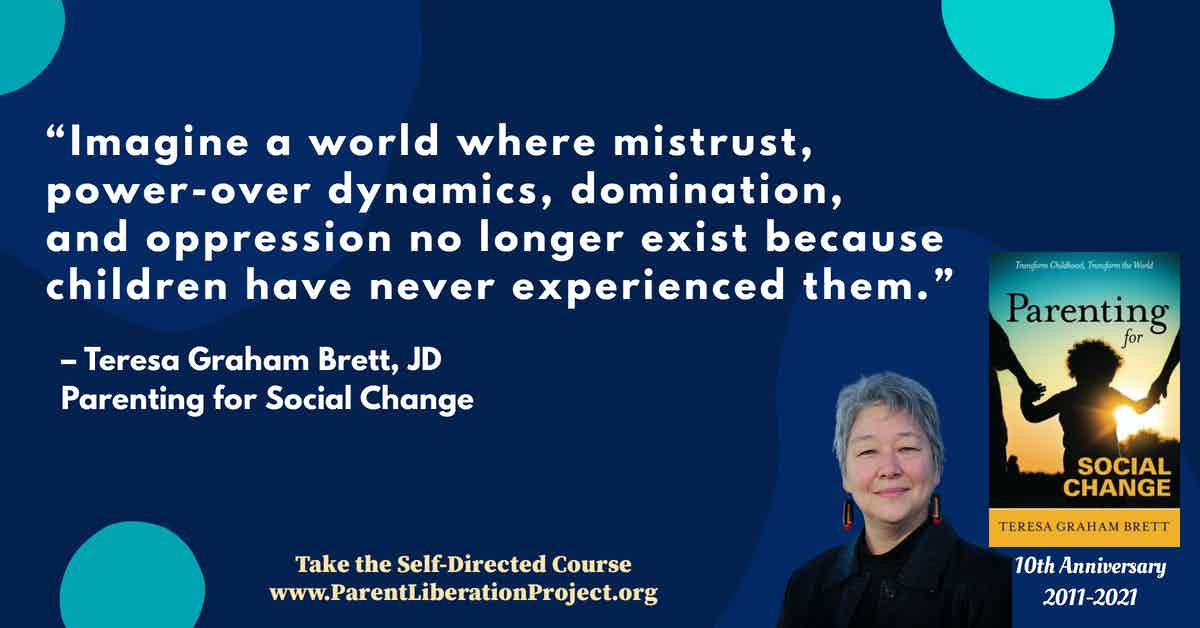Listen to Teresa discuss her book, parenting for social change
When we look around the news and see stories of war, violence, and suffering, we may wonder what we can do about it. We may feel helpless or powerless to create change.
Even though we may feel small and powerless, everything we do matters and everyone matters.
The foundation of my work is to understand how institutions, systems, cultures, and societies are built on power and control over others, and how, as a result, we internalize this paradigm throughout our lives.
In particular, the experiences we have in childhood of growing up in systems of power and control creates a world-view that persists into adulthood. We learn to believe that domination is just the way the world works.
We take for granted that we must use power and control over others.
When we are children we also take in the feelings and belief that we are little and what we do doesn’t matter. To make ourselves feel more powerful and stronger in a big world that doesn’t care what we think or do, we then turn to strategies that we learned from adults.
We use power and control over those who are weaker in order to feel strong. We hoard power and are unwilling to share it because we never experienced that as children.
If we recognize the harm we experienced in our own childhoods, we may then try to parent differently. We want to create different relationships with children. Even though we may deeply desire to parent differently we still run up against our experiences of being controlled and dominated in childhood. Often, those experiences pop up in very unexpected ways.
Using Power Over Children (and ourselves)

As adults we undeniably have power over children.
When we are with babies and smaller children, that power is obvious. We have greater physical strength and abilities. As children grow, we may use emotional control or psychological control.
We see power and force used around us everyday and we use power and force ourselves. It is what the majority of us learned to do. We use power in small and big ways internally and externally.
And as we begin to change our awareness of how control shows up in our relationships with children, we can reframe those relationships.
Creating awareness of how our need to use power and control shows up then allows us to make a conscious choice. This awareness also allows us to see how we use power and control internally, with ourselves.
Power Over vs. Power With
Using power over others is a form of violence. We exercise power over others without their consent. When we use power over others, we come from a place that what we believe or want to do is right. As a result of our “rightness” we don’t believe consent is necessary. We know better, we have more experience, and we are right.
Using power over others isolates us. Power over stops communication in it’s tracks. It disconnects us from the other person. It comes from a place of scarcity and it is fear-based.
For example, we often use power over children when we feel there isn’t enough time, money, space, patience, or whatever we believe is scarce in our lives. This is a place of scarcity and fear that drives us to disconnect. We believe we don’t have enough of whatever we need to listen to or discover what is happening for the child.
Instead let’s consider power with other.
Power with creates mutuality and respect. When we operate from a place of power with, we create a space where each person matters. Power with opens up the possibility of both sides (people) being influenced and changed by the other person.
Power with is grounded in a place of knowing that the relationship with the other person is paramount. Power with equalizes the power dynamics built into our culture and society. It allows for those who have not been heard to be seen and heard.
Power with recognizes that each individual makes a difference and can change the course of events.
Changing the World Through Our Use of Power
We can use our power for positive change to create love, justice and equal relationships or to reinforce relationship patterns of domination and control.
This past week, I was at a conference (Un in the Sun) with parents who are committed to changing these patterns of power over with children.
At the conference I presented sessions where we addressed power, control, and domination in our culture, particularly in childhood and in parent-child relationships.
During the session and in between sessions, a parent (who had been in law enforcement) and I had some amazing conversations. We entered in to a discussion about whether or not it was realistic, or desirable, to eliminate all power and control.
What struck me most about our conversation was how he described his role as a law enforcement officer. He had the legal right to use force over another person, but he would consciously choose another path. A path that favored communication over force.
As parents our role is similar.
We are given the legal right to exercise power over children. But what are the results of using that power over children?
We may get temporary compliance. We are likely to get rebellion (even if it doesn’t show up right away). Sometimes whatever force we use will be met with equal or greater force directed back at us.
Using power over reinforces each person’s position and “rightness.” We get polarization, entrenchment, and escalation of conflict.
But what if we see our responsibility as parents differently? What if we believed that using power with strategies is what we are supposed to do?
Power with children allows them to see a different way of relating to the world. It allows them to experience relationships that are mutual and respectful. It helps them to trust themselves and to see their experiences, feelings, and perspective as mutually important in a relationship.
By using power with children, we reduce their need to use power over others from a place of fear that they will not get their needs met. We reduce their need to be in competition with others in order to get their share. We shift the dynamics from either-or to both-and.
Power with children also sets up a different expectation about conflict. Conflict doesn’t have to be avoided because we are able to come together to find common understanding, not to win or lose.
Power with children also allows all of us to be more authentic in our relationships. Children don’t have to pretend to go along with whomever is stronger for fear of being judged, shamed, or hurt. This ability to be authentic and clear about who we are carries over into other relationships into the future.
When We Use Force
Even if we truly want to be a “power with” parent, we will never be perfect.
There are times as a parent that I use force. I use force out of a reactive, triggered place. I might also use force consciously.
I have used force to preserve physical safety. And it was necessary. And, sometimes I believe it was necessary, but it really wasn’t.
Even if I choose to use force, I can go back to reconnect. Critical to that process is understanding that my goal in reconnecting is not to justify my use of force.
It may be that if I just pulled a child back from getting hit by a car, he is grateful. But I don’t need him to be grateful for my use of force. Because even if I use force for all the right reasons, and I got the result I wanted (a child who is still alive), he might have strong feelings about what I did.
Power over and use of force will have negative consequences in my relationship with the children in my life. And yes, sometimes the use of force has positive consequences, obvious positive consequences, such as keeping the child from bodily harm.
But even in those situations, when I preserve physical safety, I may have still done something to harm the relationship and the feelings. By reconnecting around the experience, I give the child an opportunity to understand their experience and perhaps make sense of conflicting feelings they may have about it.
Either way, I can acknowledge the negative impact of the use of physical force. Not to make myself feel better, assuage guilt, or convince someone I was right to use force. But to acknowledge that the use of force might have had negative consequences.
When I reconnect with a child about that use of force in a very open way, I might learn more about the impact it had on them. Not to “teach them a lesson” and to push them to see why I made that choice, but for ME to understand what impact my choice had on THEM. This level of understanding deepens our connection and relationship.
The Power of Acknowledging and Being Accountable
The power of acknowledging and being accountable for use of force and power should not be overlooked.
How many of us would have benefited from hearing this from our own parents or caregivers?
Think about the impact that would have had on your relationship with those adults who used power over you when you were a child. In what ways would that relationship have been deepened and strengthened if adults could acknowledge the harm they did to children, intentionally or unintentionally.
And what if, in that acknowledgment, those adults could just hold the time and space for that child to feel whatever they feel about what happened between them, without judgment from the adult, without justification or guilt.
That is the use of power in it’s most positive form. The power to hear from the person who was harmed how she or he felt, to hear it with unconditional love.
Imagine that space, that experience. The experience of someone who was hurt being acknowledged and heard. Imagine the power of that space. Imagine how that changes the people involved. Imagine if you did that for yourself as well as others.
That is the power we have. Each of us. What we do everyday, in small ways matters. It matters for children, and for the world.




Beautiful article — I think we first need to start with finally elevating children to their full human status collectively in order to make such a hugely significant shift from power over to power with. As long as children continue to be viewed and treated as possession through the lens of the legal system we won’t ever achieve the level of sustainable change necessary to move beyond the status quo when it comes to the power/control dynamics. In fact the US is the only country that hasn’t yet ratified the UN Convention on the Rights of the Child (UNCRC)